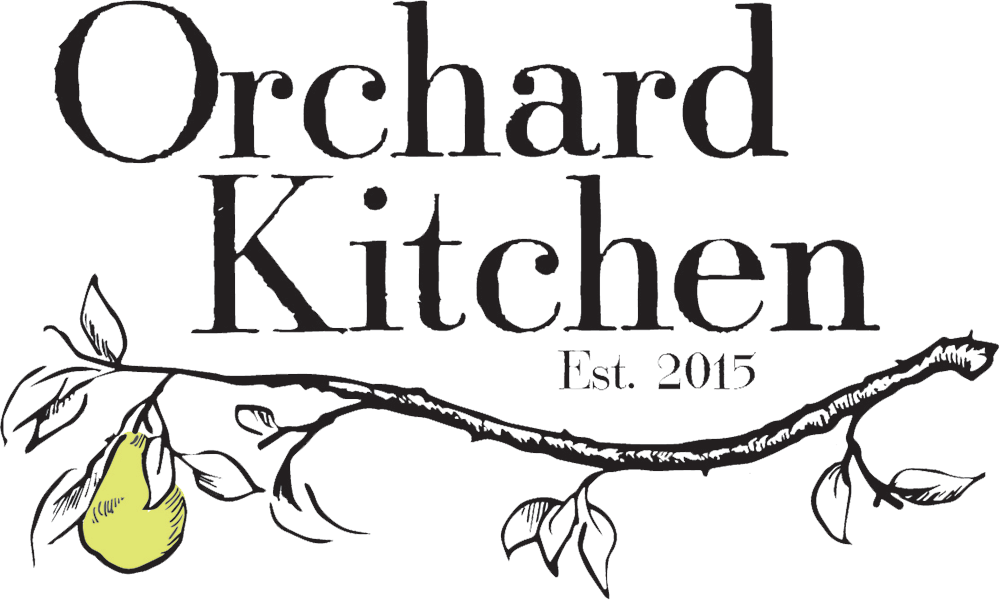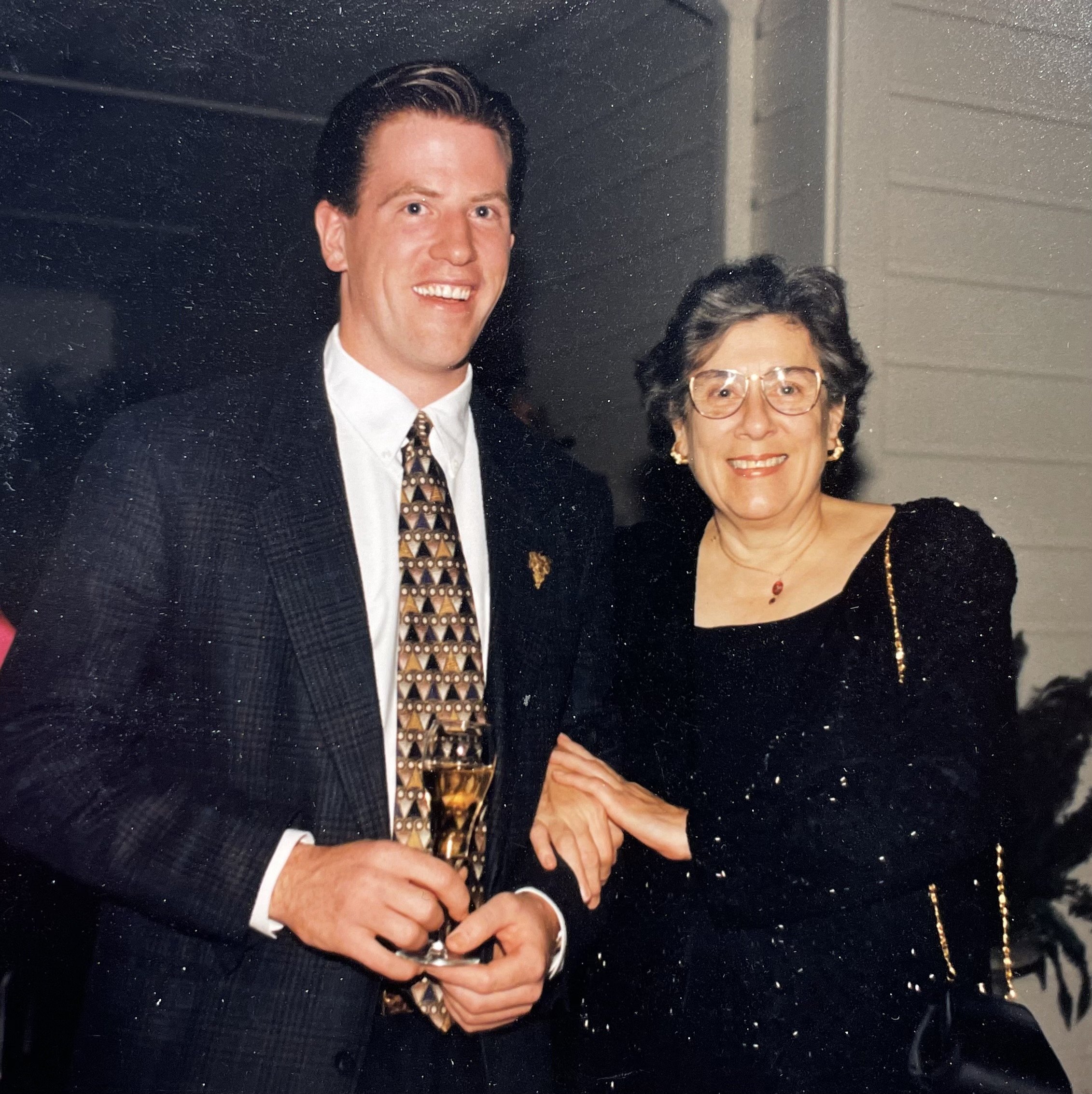Ode to Barbara Winiarski
Stag’s Leap Wine Cellar’s Christmas Party circa 1995
October 20, 2021
I never answer the phone in the restaurant, especially not on my Monday when I am just starting to organize my day. But the phone rang in a strange way today. Both handsets were on the Chef’s Table, and they rang together in a sort of dissonant, off-beat way. There was no gap between ring tones. I had never heard them ring like that before. I picked up just as the ring tone ended. The caller ID said Stephen Winiarski. Not good.
For several of my formative years, I had worked for Stephen’s parents, Warren and Barbara—the owners and founders of the acclaimed Stag’s Leap Wine Cellars in Napa Valley.
The appearance of his name immediately gave me a sinking feeling in my stomach. I called him right back and he answered. After a moment of warm pleasantries, his voice broke. His mother, Barbara, had passed away.
I met Barbara and Warren in 1993. A recent college graduate, I had gone to Napa to find a job that would allow me to learn as much as possible about food and wine. I had ended up at Stag’s Leap Wine Cellars that summer, not because I was the best candidate, but because my older brother had gone to college with the GM’s wife. It was nepotism pure and simple. It’s not that I wasn’t qualified for a tasting room job – I was over-qualified in fact – but I was not quite prepared for my rapid promotion that fall to the Hospitality Director and Winery Chef, working in very close proximity to Warren and Barbara.
The tryout for the job was a dinner cooked in their home on Halloween 1993 for 9 guests: Barbara, Warren and their daughter Julia, Jack and Jamie Davies (the founders of Schramsberg Cellars), Belle and Barney Rhodes (of Heitz Bella Oaks fame), and Bob Long and his wife (Long Vineyards). Pretty close to a “who’s who of the Napa elite” at the time.
Piece of cake, right? I’ll never forget the day prior to the dinner. I was making a spice mix in the kitchen of the Winarski’s home when Warren emerged from the bedroom following his afternoon nap. “I smell cinnamon and cloves and juniper and black pepper,” he said, correctly identifying, from the next room, four of the five spices I was toasting for the spice rub on the duck.
I remember thinking that I was absolutely out of my depth.
Dinner went well. I got the job. And it became immediately evident that the Winiarski’s were generally functioning at a level that was over my head. They talked about wine and food in abstract and metaphorical ways. They made allusions to texts I had not read and histories with which I was unfamiliar. Anywhere else I would have felt well-grounded. After all, I had just completed a degree designed specifically around food, wine, and history. I had been working in kitchens for a decade. I had spent six months of the prior two years studying and working in a Michelin-starred restaurant in France. I had even spent some time studying literature and poetry in Ireland. I was far from illiterate, but around Barbara and Warren I felt like a total fraud.
To be clear, they never made reference to their rich trove of knowledge in a showy or ostentatious way. It was more like they were saying “We love talking about ideas and this is our base of knowledge”—like they were assuming that, should I want to talk about these subjects, certainly I would be interested in doing the reading so we could discuss these things. And I was interested. I was totally excited by the prospect of rising to the challenge this opportunity presented. It was time to actually read Nietzsche, and not just BS my way along with a vague, “CliffsNotes” understanding.
Far and away the best thing about the job was working with Barbara. My kitchen was their home kitchen. The large kitchen island was adjacent to the open living area where Barbara would spend most of her day. She would read, receive guests, or sometimes watch the PBS News Hour, but what I remember most were our conversations.
Barbara had an education in the Classics from St. John’s and knew a great deal about ancient Greece. More importantly, Barbara was a very kind and very wise woman. She loved food and she loved cooks. I told her that my first introduction to cooking was preparing things from Julia Child’s PBS TV shows with my mother when I was a child. We talked about Julia and about MFK Fisher and about Madeleine Kamman. Julia’s Mastering the Art of French Cooking Volumes I and II were my bible during this period. Barbara introduced me to Marcella Hazan’s Essentials of Classic Italian Cooking, a book that is still a stand-by.
Barbara taught me a lot about what hospitality meant to her and about how to structure receptions and events with a light touch. We talked about food a lot. We shared a love of stone fruit so I would always bring Barbara the best fresh fruit I could find. Barbara would talk about how peaches never lived up to her childhood memory of what a peach should taste like; we talked about whether that was because the peaches were not as good, or because our palates had become jaded over time. And don’t even get me started on the Maryland Blue Crab vs. Dungeness Crab debates we would have.
For Barbara, food was about connection to family and place and history, and in that way we had a deep connection and shared passion.
Barbara was the soul of Stag’s Leap Wine Cellars. She paid attention to the trials and tribulations of members of the staff and cared about them very much. She was a devoted mother who spent a lot of time thinking about and doing her best to support her three children. She loved her grandchildren dearly. Together, Barbara and Warren cultivated and nurtured their relationships with their many friends. It seemed that every month there was a new set of dear old friends coming to visit who we would be entertaining at the lake or hosting for an event. Barbara would make sure I had a chance to cook for and meet people like Madeleine Kamman and writers and press people. She would always insist that I sit down with them for dessert and have a chance to engage with them. Eventually Warren and Barbara even backed my wife Tyla and me in our first restaurant, Roux (they were extremely gracious when that endeavor failed three years later).
It was clear that they cared deeply about the people that were important to them, about their family, and also about the land, the vineyards, and the valley that had given them so much.
Their involvement with the agricultural preserve in Napa and with the Land Trust have shaped how I view our little property here on Whidbey. They bought a prune orchard and turned it into one of the most celebrated vineyards and wineries in America. We bought a pasture-grazing farm, converted it to orchard and row crop farming, and created a place where we teach people about growing food and also feed them the fruits of our labors. The highest and best use of the land. That was the term Warren and Barbara used. I internalized that way of thinking.
I will not go into detail about their philanthropy because the list of recipients is far too long to recite, and of late, there are too many zeros in the amounts Warren and Barbara have given to worthy causes that have been important to them. What I will say is this: they arrived in Napa in the mid-1960’s with basically nothing. They built a legendary enterprise, trained a generation of people in the industry, made a large fortune, and then gave it right back to the charities and institutions they believe will make the world a better —and more delicious— place.
I have been thinking today about what it was that Barbara taught me about food. After all, though she was a good cook, Barbara was not a chef. I have realized that I learned most from her gentle guidance of my cooking and menu creation. Initially, like most young chefs, I would write menus that consisted of the four or five or seven dishes that I was most eager to show off. Barbara would often say something like “I think we need a bit of freshness, don’t you?” or “Perhaps that dish would be too heavy following the scallops, don’t you think?”
She was always able to direct me toward a more balanced and elegant whole, not by micromanaging or rejecting things I wanted to create but instead by helping me understand how they could fit together better, creating a more beautiful experience for the guest. She helped me understand how to structure a menu to provide contrast and rhythm that augment the entire experience.
I’m certain my food was greatly affected by her subtle direction, and I am changed to this day. I say to my cooks that I have succeeded as a chef-mentor when they hear my voice in their head telling them things like “did you taste it?” Barbara’s voice is in my head in that same, positive way, without a doubt.
To the Winiarski family, I feel your loss and my heart is with you all. Barbara Winiarski was a great woman, a friend, and a mentor. Like so many people I am blessed to have had a chance to know her.

